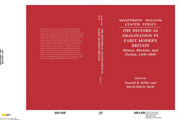Book contents
- Frontmatter
- Contents
- Preface
- WOODROW WILSON CENTER SERIES
- 1 Introduction
- 2 Precept, example, and truth: Degory Wheare and the ars historica
- 3 Truth, lies, and fiction in sixteenth-century Protestant historiography
- 4 Thomas More and the English Renaissance: History and fiction in Utopia
- 5 Little Crosby and the horizons of early modern historical culture
- 6 Murder in Faversham: Holinshed's impertinent history
- 7 Foul, his wife, the mayor, and Foul's mare: The power of anecdote in Tudor historiography
- 8 Experience, truth, and natural history in early English gardening books
- 9 Thomas Hobbes's Machiavellian moments
- 10 The background of Hobbes's Behemoth
- 11 Leviathan, mythic history, and national historiography
- 12 Protesting fiction, constructing history
- 13 Adam Smith and the history of private life: Social and sentimental narratives in eighteenth-century historiography
- 14 Contemplative heroes and Gibbon's historical imagination
- Contributors
- Index
- Titles in the series
12 - Protesting fiction, constructing history
Published online by Cambridge University Press: 04 August 2010
- Frontmatter
- Contents
- Preface
- WOODROW WILSON CENTER SERIES
- 1 Introduction
- 2 Precept, example, and truth: Degory Wheare and the ars historica
- 3 Truth, lies, and fiction in sixteenth-century Protestant historiography
- 4 Thomas More and the English Renaissance: History and fiction in Utopia
- 5 Little Crosby and the horizons of early modern historical culture
- 6 Murder in Faversham: Holinshed's impertinent history
- 7 Foul, his wife, the mayor, and Foul's mare: The power of anecdote in Tudor historiography
- 8 Experience, truth, and natural history in early English gardening books
- 9 Thomas Hobbes's Machiavellian moments
- 10 The background of Hobbes's Behemoth
- 11 Leviathan, mythic history, and national historiography
- 12 Protesting fiction, constructing history
- 13 Adam Smith and the history of private life: Social and sentimental narratives in eighteenth-century historiography
- 14 Contemplative heroes and Gibbon's historical imagination
- Contributors
- Index
- Titles in the series
Summary
Just over three hundred years ago, a typical 1690s pamphlet called The Second Spira appeared in a London bookshop in the Poultry, looking a lot like scores of other publications of the time. It reported a recent news item, recounting in detail the tormented death and last words of an unnamed religious apostate; its story was concisely and quite movingly told, the message explicit, the bead on the reader steady, and the tone predictably didactic. The death had occurred a month earlier in Westminster, and here was a circumstantial, last-hours account of someone who had literally suffered the agony of the damned – emotionally and physically – before giving up the ghost on 8 December 1692. When it appeared at John Dunton's shop on 9 January, the pamphlet was said to have been prepared from the notes of one J. S., a minister of the Church of England who had witnessed the death and recorded the agonized confession.
It is a vivid and rather well-written account, and in a decade enamored of the then-new journalism, with the last words of prisoners hanged on Tyburn's fatal tree, with the propagation of the gospel and the reformation of manners, and with the rising tides of confession and celebratory subjectivity that Jonathan Swift mocked in A Tale of a Tub, such a pamphlet on such a topic might have been expected to sell fairly well, several hundred copies perhaps. But no one (certainly not the author or bookseller) would have predicted the sensation it made.
- Type
- Chapter
- Information
- The Historical Imagination in Early Modern BritainHistory, Rhetoric, and Fiction, 1500–1800, pp. 298 - 317Publisher: Cambridge University PressPrint publication year: 1997
- 1
- Cited by



